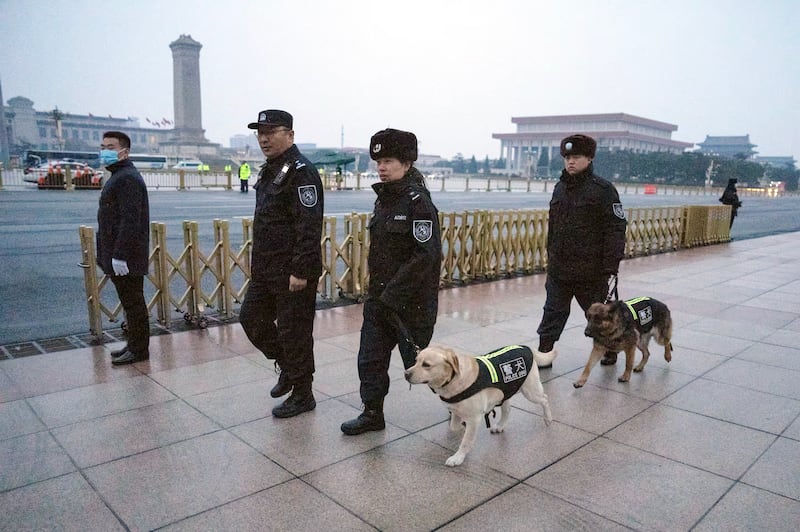Police in Beijing have been raiding suburban neighborhoods where out-of-town petitioners stay while they lodge lengthy complaints against their local governments, petitioners told Radio Free Asia.
The raids appear to be part of “stability maintenance” measures ahead of the annual parliamentary sessions.
As delegates get ready to attend the annual sessions of the Chinese People’s Political Consultative Conference advisory body, which opens on March 4, and the National People’s Congress, police and local officials across China are targeting people they think might cause some kind of trouble for the authorities, and take steps to silence or control them.
It’s called “stability maintenance,” and petitioners who use the official complaints system are a key target.
“The night before last, they came to our village to detain people,” a petitioner from Tianjin who gave only the surname Tang for fear of reprisals told RFA Mandarin on Feb. 21. “It was a big raid.”
“They took me to the government offices and held me for 24 hours,” Tang said. “They let me go because they saw that I was in poor health.”
“Around 27 or 28 people from that neighborhood were detained that night,” she said.
Who are these petitioners?
China’s army of petitioners, who flood the ruling Communist Party’s official complaints departments daily, frequently report being held in unofficial detention centers like Jiujingzhuang, beaten or harassed if they persist in a complaint beyond the initial rejection at the local level, even if they follow legal channels.
They are often escorted home forcibly by “interceptors” sent by their local governments to prevent negative reports from reaching the ears of higher authorities, where they face surveillance, violent treatment and possible detention on criminal charges, particularly during major political events or on dates linked to the pro-democracy movement.
RELATED STORIES
China starts detaining petitioners ahead of regional congresses
China’s stability maintenance system kicks into high gear on ‘sensitive dates’
Locking down dissidents ahead of China’s parliamentary sessions
“Zhang Jixin, Xu Baihong, Wang Jinping and others from [the northeastern city of] Changchun were sent to Jiujingzhuang [petitioner processing center] and then sent back to their hometowns,” Tang said.
Fellow petitioner Dong Kuihong said police confiscated some people’s phones.
“When Tian Ye was detained, they took away his mobile phone and sent him to Jiujingzhuang,” Dong said. “He’s now completely incommunicado.”
“The night before last, they took away three or four busloads of people were taken away from outside the State Bureau of Letters and Visits [government complaints department], and all of them were sent to Jiujingzhuang,” he said.
Long lines
A petitioner from the southwestern province of Sichuan who gave only the surname Zhao for fear of reprisals said there were hundreds of people still outside the bureau, lining up to make their complaints, on Feb. 21.
“The line stretched a very long way when I joined it outside the State Bureau of Letters and Visits,” Zhao said. “I went there at around 5.00 a.m., and there were 500 or 600 people standing in line.”
“The guys wearing black are the interceptors,” she said.

Delegates to the National People’s Congress and its advisory body will hear annual government work reports and consider annual plans for the economy, state news agency Xinhua reported in December.
They will also consider draft laws on the status of People’s Congress delegates at all levels.
Motions and laws general pass unanimously, or with a handful of dissenting votes or abstentions, while delegates are through “elections” that remain under the control of the ruling party throughout.
Nonetheless, the sessions are popular with petitioners, who believe their complaints will carry more weight during important political events.
A petitioner from Shanghai who gave only the surname Chen for personal safety reasons said the authorities there are also clamping down on petitioning trips to Beijing.
“It started on Feb. 13,” Chen said. “They treat each person differently.”
“I’m en route to Jiangxi right now, and I have promised them I won’t go to Beijing,” he said. “There were a lot of interceptors at the train station, and they stopped me from buying a ticket to Beijing.”
“Some people are being detained in guesthouses in rural areas,” Chen said.
A petitioner from the central city of Wuhan who gave only the surname Guo said local police had warned her not to travel to Beijing ahead of the parliamentary sessions.
“They called me yesterday and told me not to go, saying there was no point,” Guo said. “They said anyone who tries to get to Beijing will be detained beforehand.”
A petitioner from the eastern province of Jiangsu surnamed Wang said he had received an in-person visit with the same message.
“They came from the police station to tell us that there’s no point going to Beijing during the parliamentary sessions,” Wang told RFA Mandarin in an interview on Feb. 21.
“They said they would do everything they could to intercept us.”
Translated by Luisetta Mudie. Edited by Malcolm Foster.
